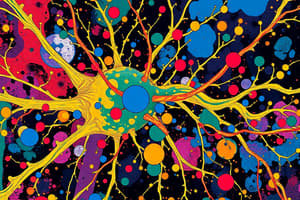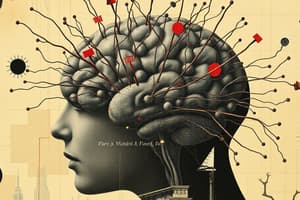Podcast
Questions and Answers
What is the primary function of neuroglia cells?
What is the primary function of neuroglia cells?
- Synthesizing neurotransmitters
- Support, nourish, and protect neurons (correct)
- Maintaining homeostasis in the nervous system
- Sensing, thinking, and muscle activity control
Neurons are not electrically excitable.
Neurons are not electrically excitable.
False (B)
What is the role of Nissl bodies in neurons?
What is the role of Nissl bodies in neurons?
protein synthesis
Neurotransmitters are synthesized in the ____________________ and stored in the synaptic end bulb.
Neurotransmitters are synthesized in the ____________________ and stored in the synaptic end bulb.
Match the following cellular components with their functions:
Match the following cellular components with their functions:
Neurotransmitters are not synthesized in the cell body.
Neurotransmitters are not synthesized in the cell body.
What is the primary function of action potentials in neurons?
What is the primary function of action potentials in neurons?
Leakage channels in neurons are always open.
Leakage channels in neurons are always open.
What type of channels respond to chemical stimuli in neurons?
What type of channels respond to chemical stimuli in neurons?
White matter primarily consists of ____________________ axons.
White matter primarily consists of ____________________ axons.
Match the following types of ion channels with their characteristics:
Match the following types of ion channels with their characteristics:
What is the direction of ion movement across the membrane via chemical gradient?
What is the direction of ion movement across the membrane via chemical gradient?
Grey matter contains myelinated axons.
Grey matter contains myelinated axons.
What is the effect of ions flowing across the membrane?
What is the effect of ions flowing across the membrane?
What is the primary function of gap junctions in electrical synapses?
What is the primary function of gap junctions in electrical synapses?
Chemical synapses have a faster communication speed compared to electrical synapses.
Chemical synapses have a faster communication speed compared to electrical synapses.
What is the effect of excitatory postsynaptic potentials (EPSP) on the postsynaptic neuron?
What is the effect of excitatory postsynaptic potentials (EPSP) on the postsynaptic neuron?
The synaptic delay at a chemical synapse is approximately _______ msec.
The synaptic delay at a chemical synapse is approximately _______ msec.
Match the following types of postsynaptic potentials with their effects on the postsynaptic neuron:
Match the following types of postsynaptic potentials with their effects on the postsynaptic neuron:
What is the function of neurotransmitters in chemical synapses?
What is the function of neurotransmitters in chemical synapses?
A postsynaptic neuron can only receive one signal at a time.
A postsynaptic neuron can only receive one signal at a time.
What is the advantage of electrical synapses in terms of neuronal communication?
What is the advantage of electrical synapses in terms of neuronal communication?
Flashcards are hidden until you start studying
Study Notes
Electrical Synapses
- Action potentials (AP) conduct between cells via gap junctions
- Gap junctions contain tubular connexons, acting like tunnels between the cytosol of two cells
- Ions flow through connexons, spreading AP
- Advantages:
- Faster communication
- Synchronization of a group of neurons or muscle fibers
Chemical Synapses
- Plasma membranes are separated by synaptic cleft
- Presynaptic neuron releases neurotransmitters (NT) into synaptic cleft
- NT binds to receptors in postsynaptic neuron, resulting in postsynaptic potential
- Electrical signal converted to chemical signal, leading to an electrical signal
- Synaptic delay of 0.5 msec
Synapses Between Neurons
- Postsynaptic potentials:
- Excitatory postsynaptic potentials (EPSP): depolarizing postsynaptic potential
- Inhibitory postsynaptic potentials (IPSP): hyperpolarizing postsynaptic potential
- A postsynaptic neuron can receive many signals at once
White and Grey Matter
- White matter consists of myelinated axons
- Grey matter contains everything else, like dendrites, cell bodies, etc.
Electrical Signals in Neurons
- Excitable cells communicate via:
- Action potentials: allow communication over short and long distances
- Graded potentials: allow communication over short distances
Ion Channels
- Allow movement of specific ions across the membrane via chemical gradient
- Move from high to low concentration
- Cation move to anionic environment and vice versa
- As ions flow, electrical current created that can alter membrane potential (MP)
Ion Channels in Neurons
- Leakage channels alternate between open and closed
- K+ channels are more numerous than Na+ channels
- Ligand-gated channels respond to chemical stimuli
- Located along the dendrites, participating in producing graded potential
Histology of the Nervous System
- 2 cell types:
- Neurons: sensing, thinking, memory, muscle activity control, gland secretion
- Neuroglia: support, nourish, protect neurons, maintain homeostasis in interstitial fluid
Neurons
- Electrically excitable
- Neurotransmitters synthesized in the cell body and stored in the synaptic end bulb
- Essential for protein synthesis (nissl bodies)
Studying That Suits You
Use AI to generate personalized quizzes and flashcards to suit your learning preferences.




